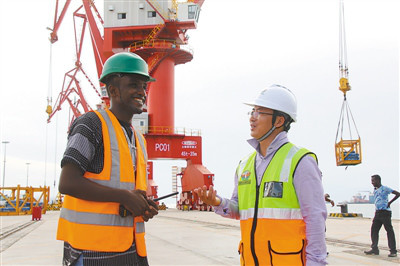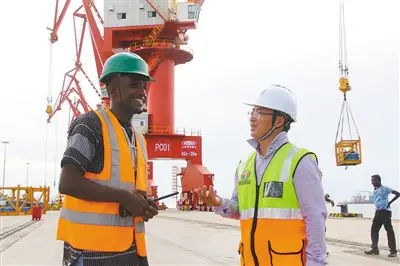By Li Zhiwei and Li Yida from People’s Daily

Pic: Two managers fromChina and Djibouti exchange views on a newly-built dock. (Photo by Li Zhiwei from People’s Daily)
Chinese companies have helped Djibouti, a country located in the Horn of Africa, develop infrastructure in the past few years, paving the way for the country’s economic development.
Djibouti has been attempting to renovate its ports over years since port economy accounts for 80 percent of its GDP. The country’s rise to prosperity was closely related to its geographical location in the Horn of Africa.
However, the country’s economy was hindered as the aging facilities could no longer satisfy the rising transportation needs.
China Merchants Group Limited (CGM) became the second-largest shareholder of the port after buying 23.5 percent equity stake from the latter in February 2013.
The multi-functional Doraleh Port, which started construction in August 2014, was completed after two years. The project consumed a total investment of $580 million, including a loan on favorable terms from the Export-Import Bank of China (EIBC).
The new port has a designed capacity of 7 million tons and is planned to hold 200,000 containers. With a water depth of 15.3 meters, the port can harbor 100,000-ton level vessels. The port is also equipped with large-scale facilities made in China, which have greatly improved its operation efficiency. The management of the port adopted China’s experience.
The port has paid an accumulated $35 million tax to the government since 2013, becoming an important taxation source for the Djiboutian government.
“The port is the lung for Djibouti’s economic development,” saidHoumed MohamedKamil, CFO of the port, adding that working with China has brought hope to his country.
With the acceleration of the “Belt and Road” initiative, investment in the construction of free trade zone, ports, rails and water delivery services came one after another. Those projects have made land price of some areas in Djibouti quintuple compared with a few years ago, according to Li Yao, a representative of the Djibouti office of CGM.
As development progressed, the 0.17-square-kilometer old free trade zone in Djibouti was also in need of expanding. In 2012, Djibouti President Ismail Omar Guellehdecided to introduce the development mode of Shekou Port in Shenzhen, Guangdong Province, to the country, after a visit to the place.
The president thought the two places shared a lot of common places. The Shekou Port was developed by CGM.
The Djiboutian government allocated 48.2 square kilometers of land, 10 percent of the country’s available land area to develop an international free trade zone in the city of Djibouti.
Two companies in charge of investment and operation were co-built by CGM and the Djiboutian side. Djibouti hoped toduplicateShekou’s transformation from a small fishing village to an international new city by combining the development of port, industrial zone and new urban district.
The city of Djibouti will be built into a new engine for the country’s economy and a financial, shipping and trade center for East Africa, Li said.
The Chinese company is sincerely offering help to develop Djibouti, according to Guelleh. The cooperation with China has brought about real changes to Djibouti, Kamilechoed.
Djibouti aims at being the first trade hub in Africa, offering convenience for 80 percent of Africa’s cargo ships that have to spend an extra five days passing through the Port of Dubai, Li said, adding that an export manufacturing zone will be established in the free trade zone to lead the country toward initial industrialization and create more jobs.
An estimated 15,000 jobs will be added, a big figure for Djibouti, a country having less than 1 million people, according to Aboubaker, chairman of Djibouti Ports and Free Zones Authority.
“Our cooperation with China is a typical win-win example. China’s advanced management experience has helped cut costs, open new market and find unprecedented business opportunities for our country,” Aboubaker said.
In recent years, Chinese people are more and more welcomed to visit Djibouti. Neima, who went to learn logistics management in Dalian Maritime University in 2013, said Africa’s future relies a lot on China, and that’s why she chose to further her study in a Chinese university.
Neima said China has invested a heftyamount in Djibouti. The local people started to realize the importance of mastering the Chinese language. The number of Djibouti students in China has doubled in just a few years.
“Djibouti will undergo exciting changes after 10 years, benefiting from the mutually beneficial cooperation with China,” she added.
The “Belt and Road” initiative brings about a huge opportunity which will change the outlook of the African continent,” said Idriss Ismail Abdi who works with the Djiboutian company of CGM port.
Idriss said he hoped to visit China in the future. The vision of China now outweighs that of the European countries among African youth, he said.
Djibouti has been attempting to renovate its ports over years since port economy accounts for 80 percent of its GDP. The country’s rise to prosperity was closely related to its geographical location in the Horn of Africa.
However, the country’s economy was hindered as the aging facilities could no longer satisfy the rising transportation needs.
China Merchants Group Limited (CGM) became the second-largest shareholder of the port after buying 23.5 percent equity stake from the latter in February 2013.
The multi-functional Doraleh Port, which started construction in August 2014, was completed after two years. The project consumed a total investment of $580 million, including a loan on favorable terms from the Export-Import Bank of China (EIBC).
The new port has a designed capacity of 7 million tons and is planned to hold 200,000 containers. With a water depth of 15.3 meters, the port can harbor 100,000-ton level vessels. The port is also equipped with large-scale facilities made in China, which have greatly improved its operation efficiency. The management of the port adopted China’s experience.
The port has paid an accumulated $35 million tax to the government since 2013, becoming an important taxation source for the Djiboutian government.
“The port is the lung for Djibouti’s economic development,” saidHoumed MohamedKamil, CFO of the port, adding that working with China has brought hope to his country.
With the acceleration of the “Belt and Road” initiative, investment in the construction of free trade zone, ports, rails and water delivery services came one after another. Those projects have made land price of some areas in Djibouti quintuple compared with a few years ago, according to Li Yao, a representative of the Djibouti office of CGM.
As development progressed, the 0.17-square-kilometer old free trade zone in Djibouti was also in need of expanding. In 2012, Djibouti President Ismail Omar Guellehdecided to introduce the development mode of Shekou Port in Shenzhen, Guangdong Province, to the country, after a visit to the place.
The president thought the two places shared a lot of common places. The Shekou Port was developed by CGM.
The Djiboutian government allocated 48.2 square kilometers of land, 10 percent of the country’s available land area to develop an international free trade zone in the city of Djibouti.
Two companies in charge of investment and operation were co-built by CGM and the Djiboutian side. Djibouti hoped toduplicateShekou’s transformation from a small fishing village to an international new city by combining the development of port, industrial zone and new urban district.
The city of Djibouti will be built into a new engine for the country’s economy and a financial, shipping and trade center for East Africa, Li said.
The Chinese company is sincerely offering help to develop Djibouti, according to Guelleh. The cooperation with China has brought about real changes to Djibouti, Kamilechoed.
Djibouti aims at being the first trade hub in Africa, offering convenience for 80 percent of Africa’s cargo ships that have to spend an extra five days passing through the Port of Dubai, Li said, adding that an export manufacturing zone will be established in the free trade zone to lead the country toward initial industrialization and create more jobs.
An estimated 15,000 jobs will be added, a big figure for Djibouti, a country having less than 1 million people, according to Aboubaker, chairman of Djibouti Ports and Free Zones Authority.
“Our cooperation with China is a typical win-win example. China’s advanced management experience has helped cut costs, open new market and find unprecedented business opportunities for our country,” Aboubaker said.
In recent years, Chinese people are more and more welcomed to visit Djibouti. Neima, who went to learn logistics management in Dalian Maritime University in 2013, said Africa’s future relies a lot on China, and that’s why she chose to further her study in a Chinese university.
Neima said China has invested a heftyamount in Djibouti. The local people started to realize the importance of mastering the Chinese language. The number of Djibouti students in China has doubled in just a few years.
“Djibouti will undergo exciting changes after 10 years, benefiting from the mutually beneficial cooperation with China,” she added.
The “Belt and Road” initiative brings about a huge opportunity which will change the outlook of the African continent,” said Idriss Ismail Abdi who works with the Djiboutian company of CGM port.
Idriss said he hoped to visit China in the future. The vision of China now outweighs that of the European countries among African youth, he said.
 Menu
Menu
 Chinese enterprise facilitates Djibouti’s development
Chinese enterprise facilitates Djibouti’s development
















